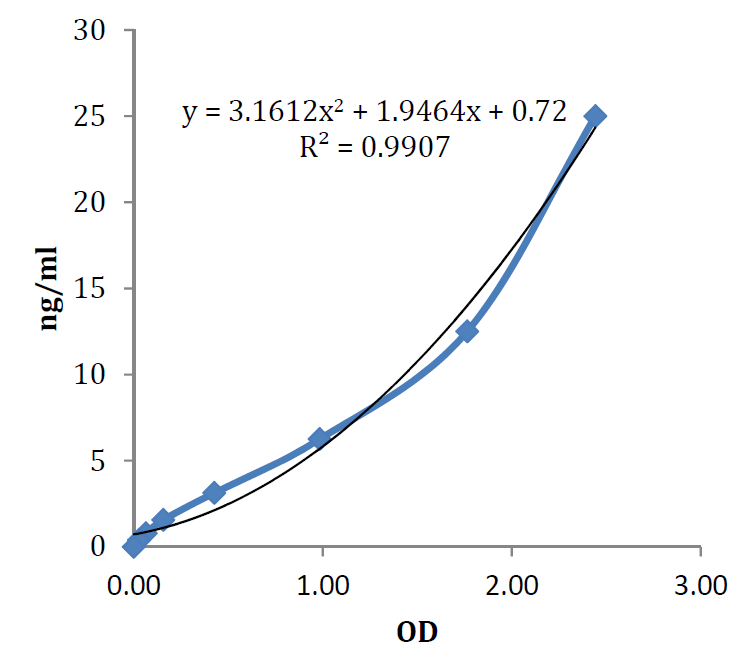RBP4 (human) ELISA Kit (Quantitative) (Twin Plex)
Product Code:
AG-45A-0035Y
AG-45A-0035Y
Regulatory Status:
RUO
RUO
Target Species:
Human
Human
Shipping:
Blue Ice
Blue Ice
Storage:
+4°C
+4°C
No additional charges, what you see is what you pay! *
| Code | Size | Price |
|---|
| AG-45A-0035YEK-KI01 | 96 wells | £500.00 |
Quantity:
| AG-45A-0035YTP-KI01 | 2 x 96 wells | £880.00 |
Quantity:
Prices exclude any Taxes / VAT
Stay in control of your spending. These prices have no additional charges, not even shipping!
* Rare exceptions are clearly labelled (only 0.14% of items!).
* Rare exceptions are clearly labelled (only 0.14% of items!).
Multibuy discounts available! Contact us to find what you can save.
This product comes from: Switzerland.
Typical lead time: 7-10 working days.
Contact us for more accurate information.
Typical lead time: 7-10 working days.
Contact us for more accurate information.
- Further Information
- Documents
- References
- Related Products
- Show All
Further Information
Alternate Names/Synonyms:
Retinol Binding Protein 4
Assay Type:
Sandwich
Detection Type:
Colorimetric
EClass:
32160000
Form (Short):
liquid
Handling Advice:
After standard reconstitution, prepare aliquots and store at -20°C.Avoid freeze/thaw cycles.Plate and reagents should reach room temperature before use.
Long Description:
ELISA Assay. Detects human RBP4. Does not cross-react with mouse RBP4, rat RBP4, human adiponectin, human resistin, human vaspin, human leptin or human Nampt. Colorimetric assay. Sample Types: Cell Culture Supernatant, Plasma, Serum, Urine. Range: 0.39 to 25ng/ml. Sensitivity: 380pg/ml. Retinol binding protein 4 (RBP4; RBP) is a 21kDa secreted protein, a member of the lipocalin family and is known as the primary transporter of retinol (vitamin A) to tissues. A recent report revealed RBP4 as an adipokine linking glucose transporter 4 (GLUT4) suppression in adipose tissue to insulin. Elevated human and mouse serum RBP4 levels are associated with insulin resistance and its severity, obesity and certain components of metabolic syndrome. Furthermore, human serum RBP4 levels are closely related to renal function and recent studies have shown an association between serum RBP4 levels and urinary albumin excretion. The urinary RBP4 concentration may be a valuable marker for both, insulin resistance and microalbuminuria in insulin-resistant subjects.
NCBI, Uniprot Number:
P02753
Package Type:
Box
Product Description:
Retinol binding protein 4 (RBP4; RBP) is a 21kDa secreted protein, a member of the lipocalin family and is known as the primary transporter of retinol (vitamin A) to tissues. A recent report revealed RBP4 as an adipokine linking glucose transporter 4 (GLUT4) suppression in adipose tissue to insulin. Elevated human and mouse serum RBP4 levels are associated with insulin resistance and its severity, obesity and certain components of metabolic syndrome. Furthermore, human serum RBP4 levels are closely related to renal function and recent studies have shown an association between serum RBP4 levels and urinary albumin excretion. The urinary RBP4 concentration may be a valuable marker for both, insulin resistance and microalbuminuria in insulin-resistant subjects.
Range:
0.39 to 25ng/ml
Sample Type:
Cell Culture Supernatant, Plasma, Serum, Urine
Sensitivity:
380pg/ml
Specificity:
Detects human RBP4. Does not cross-react with mouse RBP4, rat RBP4, human adiponectin, human resistin, human vaspin, human leptin or human Nampt.
Transportation:
Non-hazardous
UNSPSC Category:
ELISA Kits
UNSPSC Number:
41116126
Use & Stability:
12 months after the day of manufacturing. See expiry date on ELISA Kit box.
References
Two patterns of adipokine and other biomarker dynamics in a long-term weight loss intervention: M. Blueher, et al.; Diabetes Care 35, 342 (2012) | The normoglycemic first-degree relatives of patients with type 2 diabetes mellitus have low circulating omentin-1 and adiponectin levels: S. Akbarzadeh, et al.; Cytokine 58, 295 (2012) | Increased plasma levels of retinol-binding protein 4 with visceral obesity is associated with cardiovascular risk factors: J.C. Won, et al.; J. Diabet. Invest. 3, 457 (2012) | The association of carotid intima media thickness with retinol binding protein-4 and total and high molecular weight adiponectin in type 2 diabetic patients: M. Mansouri, et al.; J. Diabet. Metab. Dis. 11, 2 (2012) | Effects of a Combined Aerobic and Resistance Exercise Program on C1q/TNF-Related Protein-3 (CTRP-3) and CTRP-5 Levels: H.Y. Choi, et al.; Diabetes Care 36, 3321 (2013) | Associations between tissue visfatin/nicotinamide, phosphoribosyltransferase (Nampt), retinol binding protein-4, and vaspin concentrations and insulin resistance in morbidly obese subjects: Z. Goktas, et al.; Mediators Inflamm. 2013, 861496 (2013) | Lack of relationship between cord serum angiopoietin-like protein 4 (ANGPTL4) and lipolytic activity in human neonates born by spontaneous delivery: H. Ortega-Senovilla, et al.; PLoS One 8, e81201 (2013) | Associations of retinol-binding protein 4 with oxidative stress, inflammatory markers, and metabolic syndrome in a middle-aged and elderly Chinese population: Y. Liu, et al.; Diabetol. Metab. Syndr. 6, 25 (2014) | Identification of adipokine clusters related to parameters of fat mass, insulin sensitivity and inflammation: G. Flehmig, et al.; PLoS One 9, e99785 (2014) | Amyloid deposition in a mouse model humanized at the transthyretin and retinol-binding protein 4 loci: X. Li, et al.; Lab. Investig. 98, 512 (2018) | Development of a mouse IgA monoclonal antibody-based enzyme-linked immunosorbent sandwich assay for the analyses of RBP4: N.S. Lee, et al.; Sci. Rep. 8, 2578 (2018) {{media url= | Serum Carotenoids Are Inversely Associated with RBP4 and Other Inflammatory Markers in Middle-Aged and Elderly Adults: L. Jing, et al.; Nutrients 10, 260 (2018) | Higher serum carotenoids associated with improvement of nonalcoholic fatty liver disease in adults: a prospective study: ML Xiao, et al.; Eur. J. Nutr. 58, 721 (2019) | Retinol-binding protein-4 was associated with sensitization to inhalant allergens in the elderly population: B.K. Kim, et al.; KJIM ahed of print (2020)
Related Products
| Product Name | Product Code | Supplier | RBP4 (human) (rec.) | AG-40A-0041 | AdipoGen Life Sciences | Summary Details | |||||||||||||||||||||||||||||||||||||||||||||||||||||||||||||||||||||||||||||||||||||||||||||
|---|---|---|---|---|---|---|---|---|---|---|---|---|---|---|---|---|---|---|---|---|---|---|---|---|---|---|---|---|---|---|---|---|---|---|---|---|---|---|---|---|---|---|---|---|---|---|---|---|---|---|---|---|---|---|---|---|---|---|---|---|---|---|---|---|---|---|---|---|---|---|---|---|---|---|---|---|---|---|---|---|---|---|---|---|---|---|---|---|---|---|---|---|---|---|---|---|---|---|---|



